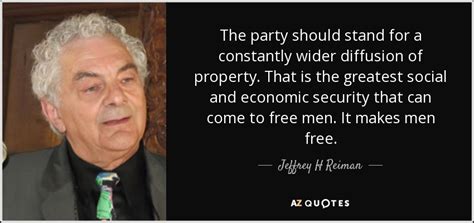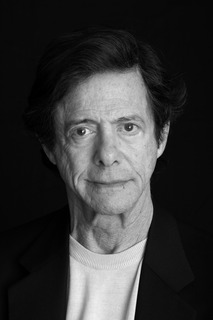A Quote by Jeffrey H Reiman
The widespread distribution of private property ownership is the cornerstone of American liberty. Without it neither our free enterprise system nor our republican form of government could long endure.... The next Republican Administration will...not only protect the cherished human right of property ownership, but will also work to help millions of Americans - particularly those from disadvantaged groups - to share in the ownership of the wealth of their nation.
Quote Topics
Administration
Also
American
American Liberty
Cherished
Cornerstone
Could
Disadvantaged
Distribution
Endure
Enterprise
Form
Free
Free Enterprise
Free Enterprise System
Government
Groups
Help
Human
Liberty
Long
Millions
Nation
Neither
Next
Nor
Only
Our
Ownership
Particularly
Private
Private Property
Property
Property Ownership
Protect
Republican
Right
Share
System
Those
Wealth
Widespread
Will
Without
Work
Related Quotes
We hold that the ownership of private property is the right and privilege of every American citizen and is one of the foundation stones upon which this nation and its free enterprise system has been built and has prospered. We feel that private property rights and human rights are inseparable and indivisible. Only in those nations that guarantee the right of ownership of private property as basic and sacred under their law is there any recognition of human rights.
Unlike the Marxists, the Nazis did not advocate public ownership of the means of production. They did demand that the government oversee and run the nation's economy. The issue of legal ownership is secondary; what counts is the issue of control. Private citizens, therefore, may continue to hold titles to property-so long as the state res...erves to itself the unqualified right to regulate the use of their property.
One ideological claim is that private property is theft, that the natural product of the existence of property is evil, and that private ownership therefore should not exist... What those who feel this way don't realize is that property is a notion that has to do with control - that property is a system for the disposal of power. The absence of property almost always means the concentration of power in the state.
Under fascism, citizens retain the responsibilities of owning property, without freedom to act and without any of the advantages of ownership. Under socialism, government officials acquire all the advantages of ownership, without any of the responsibilities, since they do not hold title to the property, but merely the right to use it -- at least until the next purge. In either case, the government officials hold the economic, political and legal power of life or death over the citizens.
Our Founding Fathers well understood that concentrated power is the enemy of liberty and the rights of man. They knew that the American experiment in individual liberty, free enterprise and republican self-government could succeed only if power were widely distributed. And since in any society social and political power flow from economic power, they saw that wealth and property would have to be widely distributed among the people of the country. The truth of this insight is immediately apparent.
The effect of the corporation, under the prevailing policy of the free, go-as-you-please method of organization and management, has been to drive the bulk of our people, other than farmers, out of property ownership; and, if allowed to go on as present, it will keep them out... The paramount problem is not how to stop the growth of property, and the building up of wealth, but how to manage it so that every species of property, like a healthy growing tree will spread its roots deeply and widely in the soil of a popular proprietorship.
If history could prove and teach us anything, it would be the private ownership of the means of production as a necessary requisite of civilization and material well-being. All civilizations have up to now been based on private property. Only nations committed to the principle of private property have risen above penury and produced science, art, and literature. There is no experience to show that any other social system could provide mankind with any of the achievements of civilization.
Monopolistic capitalism is to blame for this; it sunders the right to own property from responsibility that owning property involves. Those who own only a few stocks have no practical control of any industry. They vote by postcard proxy, but they have rarely even seen "their" company. The two elements which ought to be inextricably joined in any true conception of private property - ownership and responsibility - are separated. Those who own do not manage; those who manage; those who manage and work do not control or own.
All the alleged key causes of SOE [State-Owned Enterprise] inefficiency - the principal-agent problem, the free-rider problem and the soft budget constraint - are, while real, not unique to state-owned enterprises. Large private-sector firms with dispersed ownership also suffer from the principal-agent problem and the free-rider problem. So, in these two areas, forms of ownership do matter, but the critical divide is not between state and private ownership - it is between concentrated and dispersed ownerships.
The difference between [socialism and fascism] is superficial and purely formal, but it is significant psychologically: it brings the authoritarian nature of a planned economy crudely into the open. The main characteristic of socialism (and of communism) is public ownership of the means of production, and, therefore, the abolition of private property. The right to property is the right of use and disposal. Under fascism, men retain the semblance or pretense of private property, but the government holds total power over its use and disposal.
































